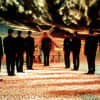Each Tuesday, FADER editor Matthew Schnipper highlights an underappreciated release he thinks we need to know about. This week it’s DJ Nate's "Make ’em Run" 12-inch, along with its potential predecessors in vocal work, the not so slept on Burial and Steve Reich. Listen to "Make ’em Run" and Schnipper’s thoughts after the jump.
Not long after Burial’s Untrue was released, someone realized that the super emotional vocal sample on “Arcangel” was from a Ray J song. Ray J is an R&B singer third. First he is the costar of the Kim Kardashian sex tape, second he is the brother of Brandy. Third, yeah, he’s got some songs. I’m underselling him—he’s got a strong voice and an equally strong following, but when the Wiki history books are written, the footnotes are going to loom large and fog his somewhat generic, if not uncatchy, contributions to the wonderfully overwrought world of modern R&B. The song Burial sampled, “One Wish,” has a video of Ray J pining in the rain for his number one. It’s a somewhat generic paean, if not effective. How Burial decided, out of all syrupy songs, that this Ray J number, that his couldn’t be alone would shape his song, a depressing, abject little vocal snippet such a heavy crux, lord knows. But it’s the lack of importance that gives it so much renewed heft, reappropriated, something like designer vintage from a crap brand. Burial’s the prism, Ray J just the voice, just the vessel.
Music with manipulated vocals didn’t originate with Burial by a long shot—not even within the context of UK electronic and dance music is he the first to utilize vocal samples so prominently—but he has been especially crafty in his creative license and recycling. “Arcangel is so heavy because it is so meaningless. Couldn’t be alone is so generic, its sample source so unconvincing, and because of that lackluster pedigree, his inversion is more devastating. Couldn’t be alone, over and over, shifted down to sound ghostlike, is dark, wild and haunting. In a 2007 interview with Wire, Burial said, “I’d love these vocals that would come in, not proper singing but cut-up and repeating, and executed coldly. It was like a forbidden siren.” When he finished a song, regardless of its other qualities, it was the vocal that made it cohesive. “I couldn’t believe that I’d done a tune that gave me that feeling that proper real records used to, and the vocal was the one thing that seemed to take the tune to that place.”
It seems almost too no duh to say that vocals draw people to music. Think of the times you’ve googled a song’s lyrics, how often you do karaoke, when you sing along in the car. My high school yearbook has lyrics from a hardcore band because nothing else better summed up my 18 years better than something about “participating in the compassionate revolution.” But what Burial and his peers, predecessors and followers are using is something other than a lyric and it may be more pungently heavy for it. Without context, the texture and tone of the voice becomes just as crucial as its content.
DJ Nate is a 20-year-old kid from Chicago who made a lot of songs. Listening to one of them, “Make ’em Run,” with my friend Brian on Friday, he said that the vocal sample reminded him of Steve Reich. This is undeniably true, and also completely crazy and awesome. Let’s back up: In the mid ’60s, Steve Reich, a minimalist composer, began to experiment with using brief bits of audio in his recordings, most famously in the two pieces “It’s Gonna Rain” and “Come Out.” In this video, Reich describes in detail his recording of a street preacher saying “It’s gonna rain!” and the accompanying pigeon flap that created the warped percussion noise as his two recordings of the speech, looped up on tape and played from the same start, eventually phase in and out. He describes the effect as being like windshield wipers synchronizing, falling out of alignment and then rejoining. It’s a trippy effect, the voice eventually reduced to a heavy warp, still identifiable as human, but without any semblance of humanity. “Come Out,” made two years later, is more directly heavy in the Burial sense. It opens with the full sample of a civil rights riot attendee who was beaten and, in order to convince the police he was injured enough to be taken to the hospital, had to make himself bleed. “I had to, like open the bruise up and let some of the bruise blood come out to show them.” This devolves into a dual playing of just the bit “come out to show them,” two recordings playing in tandem, similarly slowly losing focus and sync. It’s a clean sample, lacking in pigeon wing percussion, and the sounds are more distinctly musical. “It’s gonna rain!” was one large glom of an exclamation. Here you get the hard “K” sound in “come” and the steam of “sh” in “show,” two very different tones bumped up together. The repetition becomes quick and curt, largely rhythmic. Reich compares the idea to “Frere Jacques” and what else is catchier? It’s an abstract set of repeating tones, but the brevity of it keeps it from being too harsh, too otherworldly. The political content, attached in idea but not in language (“come out to show them” itself not meaning much of anything on its own), lingers, conjoined in spirit eventually just as effective, if not more so, than literally. But, regardless of emotional heft or modern classical experimental prowess, it’s got a pretty steady beat. Honestly, it swings. And in that vocal repetition, it sounds like DJ Nate.
DJ Nate's output can loosely be deemed the weirdest type of footwork, a Chicago genre of hyper dance music, thin drums, toy machine gun sounds and cyclical vocal bits. In the case of “Make ’em Run,” he starts similar to “Come Out,” “All my bangers in the club, burn his ass and ’em run,” which then becomes, to infinity, “make ’em run.” Nate shifts the vocal up, chops it to death, giving it the same double time sync effect as Reich’s pieces. It also makes it sound extremely mean, as though “making him run” might be the most punishing thing on any dancefloor ever. Similarly to “Come Out,” whatever context it has, it also just sounds kinda fun. Like Burial, too, it’s not a lot of words to learn to sing along to. So the little peaks in tone become part of the lyrics you learn, as well, when “make ’em” goes into triple time is the same as when “come out” doubles back to have a moment that sounds like “comma” is being heavily whispered. It’s psychedelic and intoxicating, and as much as it has to do with text, it mostly has to do with feel. DJ Nate, in addition to the six-song single of “Make ’em Run,” has a 25-track album of footwork songs, Da Trak Genious. It’s a lot of similar songs bleeding into each other, some R&B samples, some vaguely gangster, some rap, an almost obnoxious amount of repetition turning zen.
I’ve always felt that nothing in music was more important than the drums. An aerial view of that just means rhythm. With Burial, Reich, DJ Nate, they transform voice into rhythm, really into an extended definition of percussion. It’s up to the listener to assign worth to the content of the words. Reich is clearly a ’60s liberal, but he’s primarily a hugely forward sounding composer. Balancing the mind blowing inherent in his syncopation experiments with the lefty content is an impossible task, but for how outer space the sounds become, it feels as though tone was the crucial element. Pleasure or pain is secondary, wonderment (be it stoned or academic) feels primary. DJ Nate, pleasure is the heavy crux. Halfway through “Back Up Kid,” Genious’ opening track, the vocals plateau into such a heavy stutter it doesn’t feel like music. It doesn’t feel like anything. It feels crazy, a sugar rush gone pretty bad. Like Reich, it’s just admirable to see such stupid adventure voiced by manipulated people.
But Burial may have best utilized the voice. He repurposed all of the tropes of dance music to create something that is not dance music, a breakthrough that feels totally baffling but turned out to be hugely prescient, shaping how endless people both make and hear music less than ten years after his first release. Honestly, I wasn’t alive to see Reich’s ’60s weirdness firsthand, but in historical 20/20, it seems almost inevitable, a genius slowly unfurling his gifts, barreling down barriers one at a time. Burial did something that didn’t feel necessary and made it crucial. It’s a silly comparison and I’m certainly not attempting to assign worth, but the blandly stupid reassignment of Ray J as the spokesman for the most emotionally tough moments of your musical life is so confusing it feels unassailably perfect.

